This article was co-authored by Rahti Gorfien, PCC. Rahti Gorfien is a Life Coach and the Founder of Creative Calling Coaching, LLC. She specializes in working with artists, entrepreneurs, and college students in creative fields. Rahti is accredited as a Professional Certified Coach (PCC) by the International Coach Federation, an ACCG Accredited ADHD Coach by the ADD Coach Academy, and a Career Specialty Services Provider (CSS). In addition, she has personal experience in the fields she coaches - she is an alumnus of the New York University Graduate Acting program and has been a working theater artist for over 30 years. She was voted one of the 15 Best Life Coaches in New York City by Expertise in 2018.
There are 8 references cited in this article, which can be found at the bottom of the page.
wikiHow marks an article as reader-approved once it receives enough positive feedback. This article received 11 testimonials and 80% of readers who voted found it helpful, earning it our reader-approved status.
This article has been viewed 2,460,355 times.
Whether you partied all night, stayed up with a newborn, or lost sleep while finishing up a project, now you're at work and you're having a difficult time staying awake. You promise yourself that you'll get more sleep if you can just make it through the day without being discovered by your boss with your eyes closed. Falling asleep on the job can risk your employment, and may signal a larger problem with your sleep habits.
Steps
Quick Tips For Staying Alert
-
1Listen to music. Perk yourself up by listening to music.[1] Music triggers emotional responses in humans, helping us to engage many parts of the brain.
- Listen to music that's energizing to you. If possible, dance or sing along, even if you just bob your head or hum. Music that's irritating or jarring may keep you awake better than music that's familiar. Just do your co-workers a favor and remember to use headphones!
- Listen quietly instead of loudly. It's a common misconception that blasting music loud will help keep you awake. Actually, turning the music down to a very low level is more effective. It forces you to try to listen closely in order to hear the instruments, lyrics, and percussion. If you're having difficulty discerning the lyrics, then the volume is just right, because this means your mind's working.
-
2Get interested! Getting interested can work as a distraction. If you are interested in something, your brain is focusing.[2] You can get interested in your work or something that is happening in your surroundings.Advertisement
-
3Expose yourself to bright light. Preferably, natural daylight. Your body's internal clock (its circadian rhythms) are regulated by your exposure to sunlight. This means you can trick your body into believing it should be awake even when it feels tired.
- Step outside, even just for a bit. If you can step outside (even on a cloudy day) or look out the window for a full minute, you'll be more alert.
- Work the artificial lights. Even if you're in an environment where there's artificial light, brighter is better. Wherever you work, see if you can replace the light fixture or add a lamp that will brighten your workspace.
-
4Chew ice. If you chew ice, it's almost impossible to fall asleep. The chilling temperature keeps the brain on its toes, even while you are driving late at night, exhausted, and what you really want to do is fall asleep.
- Chewing anything, even if it's just your pen or pencil, causes your body to think you are about to eat. Your body will prepare for food intake by releasing insulin, which will make you more alert.
-
5Splash cold water on your face. If it's a little cold, take off your sweater or jacket so you stay on the chilly side. Open a window or put on a small fan, pointed at your face.
- The reason your body responds the way it does to cold is that it's prepping itself to work to keep you warm. Your body needs to regulate your internal temperature to keep all of its organs functioning. So if it detects ice or extreme cold, it will work to keep itself awake longer.
-
6Use your sense of smell. A pungent scent — good or bad — can make you more alert very quickly. Aromatherapists often recommend essential oils of the following plants to stimulate the nervous system and reduce fatigue. Open the bottle and take a big whiff of the following when you're feeling drowsy:
- Eucalyptus blue gum
- Peppermint
- Coffee; beans or brewed, both work: a study has shown that simply smelling coffee can awaken a person.[3]
- Of course, not all of us have essential oils stored in our file cabinets. Using hand lotions or burning candles with these same scents could help. Herbs like rosemary and peppermint can often be found fresh or dried at a grocery store; for a little pick-me-up, take a pinch and roll it between your fingertips and smell it.
-
7Eat healthy. Eating can help you stay awake, as long as you avoid a full stomach. As most of us know, eating to excess often makes us sleepy, so don't eat a full pizza or that 12 oz. steak during lunch.[4]
- Munch on snacks all day rather than having a big meal. The key is to not get a spike of sugar intake (followed by the inevitable crash). Predictably, the same goes for caffeine: break your coffee, soda, or energy drink consumption down into small doses.
- Avoid breakfast that are high in carbs (muffins, toast, pastries, bagels, etc.). You're giving your body a reason to crash at about 11 AM because it gets a sugar spike early on.
- Put a small handful of sunflower seeds in your cheek and crack them open one at a time, using only your teeth and tongue; this will require just enough active thought and tongue movement to prevent you from dozing off, and the salt of the sunflower seeds is invigorating and stimulating; spit out the sunflower husks into a paper cup as you go, as quietly as possible so as to not disturb others around you.
-
8Play a game. The internet is full of interesting websites where you can choose from a variety of games to play online. Pick a word game, or a puzzle, a car racing game or anything that suits your liking. Spending just about 15-20 minutes playing a game will awaken your mind because it is not taxing or boring in any way. It's more fun if you pick a game you're good at.
Exercising To Stay Awake
-
1Try stretching. Stretching and twisting your body can help improve blood circulation, which helps keep you awake. Rolling your head/neck for about 20 seconds can help as well.
-
2Use acupressure. Massaging any of the following points will improve circulation and ease fatigue:
- The top of your head. Lightly tap it with your fingertip or use a scalp massager.
- The back of your neck.
- Back of your hands. Right between the thumb and index finger is best.
- Just below the knees.
- Earlobes.
-
3Exercise in the office. Just because you're sitting down doesn't mean you can't use your muscles. So exercise at your computer, or get up every once in a while and stimulate some blood flow to keep you alert.
- Try simple exercises like jumping jacks, push-ups, crunches, and squats. Don't push yourself like you do in the gym; instead, just exercise enough to get your blood flowing and keep your coworkers from noticing your strange behaviour!
- Stay on your feet as much as possible. If you're sitting most of the time, get yourself up every 20-30 minutes. If you need any motivation to stand more of the time, consider this: people who stay seated for less than three hours a day add almost two years to their life expectancy.
- If you have to sit down, get the most uncomfortable chair you can find. Try not to sit in anything that will make you sore if you stay there. Make sure the back is upright, forcing you to sit up very straight. Don't allow your head to rest on anything — your hands, the desk, the wall.
-
4Take a short walk. Some people take a short walk to re-energize themselves. It's generally thought to be a good distraction, especially if you're sitting in front of a computer screen all day long.[5]
- Any paperwork that may be pending which you have to carry to your colleagues or a manager (like signing a cheque or documents), keep aside. When you feel sleepy, take it to the person for signing (or any other action). Upon returning to your desk, you'll feel more awake again and you'll have been active.
- Studies show that taking short breaks from work actually helps your productivity.[6] So if you're worried about missing that deadline, don't stress! Walking breaks will help you. (You can let your boss know.)
Other Strategies
-
1Take a power nap. If you have the time, sleeping for just 15-20 minutes can increase your alertness by leaps and bounds if you have a cup of coffee (or any other form of caffeine) right before you fall asleep. The caffeine will take about 20 minutes to begin working, so you shouldn't have any trouble falling asleep right away, and you'll wake up refreshed.[7]
- Sleeping just 20 minutes helps activate the right hemisphere of the brain, which is responsible for processing and storing acquired information.
-
2Have a regular bedtime and a healthy diet. Brains benefit greatly from schedules. If you go to bed and wake up at the same time every day, even the weekends, your brain know when it's time to sleep and fall into a pattern. Getting proper nutrition will also ensure that your body has the proper energy throughout the day without having to resort to naps for extra strength.
- How much should you sleep to ensure that you're properly rested? Adults need anywhere from 7-9 hours of sleep per night.[8] If you are pregnant or older, you may need even more sleep, anywhere from 10-11 hours.
- Some recommend[9] going to sleep with your curtains halfway open. The early morning sunlight will send signals to your body to slow production of melatonin and start production of adrenaline, making it easier to wake up.
-
3Focus your mental powers. It sounds hard, but don't let your mind go into the "fuzzy stage." When your mind starts to go blank, think about something, whether it's a joke, a movie, or anything else to keep your mind working. Even thinking about something that makes you mad can be extremely helpful. Unless they're drinking, you typically don't see an angry person abruptly fall asleep.
-
4Call someone. Make a call to a friend or a cousin or anyone who makes you laugh. A light conversation will definitely refresh your mind and you will be ready to start working before you know. Take a stroll while talking on the phone. It will keep you active. People tend to converse more animatedly when they walk and talk.
Expert Q&A
Did you know you can get expert answers for this article?
Unlock expert answers by supporting wikiHow
-
QuestionHow can I stay awake at work without caffeine?
 Rahti Gorfien, PCCRahti Gorfien is a Life Coach and the Founder of Creative Calling Coaching, LLC. She specializes in working with artists, entrepreneurs, and college students in creative fields. Rahti is accredited as a Professional Certified Coach (PCC) by the International Coach Federation, an ACCG Accredited ADHD Coach by the ADD Coach Academy, and a Career Specialty Services Provider (CSS). In addition, she has personal experience in the fields she coaches - she is an alumnus of the New York University Graduate Acting program and has been a working theater artist for over 30 years. She was voted one of the 15 Best Life Coaches in New York City by Expertise in 2018.
Rahti Gorfien, PCCRahti Gorfien is a Life Coach and the Founder of Creative Calling Coaching, LLC. She specializes in working with artists, entrepreneurs, and college students in creative fields. Rahti is accredited as a Professional Certified Coach (PCC) by the International Coach Federation, an ACCG Accredited ADHD Coach by the ADD Coach Academy, and a Career Specialty Services Provider (CSS). In addition, she has personal experience in the fields she coaches - she is an alumnus of the New York University Graduate Acting program and has been a working theater artist for over 30 years. She was voted one of the 15 Best Life Coaches in New York City by Expertise in 2018.
Life Coach
-
QuestionCan I use these methods if I am only a student and have a lot of homework to complete?
 Community AnswerCertainly! You can use any of these methods to help keep you awake while you are doing homework. Consider giving yourself a few breaks in between assignments as well; this will help refresh your mind, and make it easier for you to stay focused.
Community AnswerCertainly! You can use any of these methods to help keep you awake while you are doing homework. Consider giving yourself a few breaks in between assignments as well; this will help refresh your mind, and make it easier for you to stay focused. -
QuestionI find it hard to wake up early when the day is all about work but easier on the weekends. How do I wake up earlier on a weekday?
 Community AnswerGradually. Have a peaceful alarm to raise you out of sleep, something soothing but loud enough to awake you. Try to set it earlier so that you can do something you love to begin the day, such as playing a sport, reading, doing yoga, etc. That will give you the enthusiasm for getting up. It's tough for a while, but start adjusting slowly, and then it might become easier.
Community AnswerGradually. Have a peaceful alarm to raise you out of sleep, something soothing but loud enough to awake you. Try to set it earlier so that you can do something you love to begin the day, such as playing a sport, reading, doing yoga, etc. That will give you the enthusiasm for getting up. It's tough for a while, but start adjusting slowly, and then it might become easier.
Warnings
- Limit caffeine intake to 300 mg or less a day (about 4-8 cups of tea) to avoid counterproductive side effects.⧼thumbs_response⧽
- Many of the things that you do to stay awake also interfere with concentrating. What you'll really need, ultimately, is good sleep in order to perform optimally.⧼thumbs_response⧽
- No matter how awake you think you are if you're feeling sleepy while driving, pull over and take a 20-minute nap.⧼thumbs_response⧽
- Have always 8 hours of sleep during the night. The best time to sleep is from 10 pm to 6 am.⧼thumbs_response⧽
- Some people may be allergic to essential oils and the smells they produce. Be considerate to your co-workers and make sure they are OK with you having smells emanating from your cubicle/office.⧼thumbs_response⧽
References
- ↑ Rahti Gorfien, PCC. Life Coach. Expert Interview. 17 December 2019.
- ↑ Rahti Gorfien, PCC. Life Coach. Expert Interview. 17 December 2019.
- ↑ http://www.dailymail.co.uk/health/article-1025849/Wake-smell-coffee--yes-best-way-cure-tiredness.html
- ↑ https://www.nhs.uk/live-well/sleep-and-tiredness/the-energy-diet/
- ↑ https://health.clevelandclinic.org/5-great-reasons-you-should-take-a-walk-today/
- ↑ http://www.nytimes.com/2012/06/17/jobs/take-breaks-regularly-to-stay-on-schedule-workstation.html?_r=0
- ↑ https://health.clevelandclinic.org/power-naps/
- ↑ http://www.mayoclinic.com/health/how-many-hours-of-sleep-are-enough/AN01487
- ↑ http://www.rd.com/health/wellness/24-ways-to-brighten-your-morning/
About This Article
To stay awake at work, play music that energizes you or that you can quietly sing along to. Additionally, stepping outside for a few minutes or exposing yourself to some bright lights will send a signal to your body that it should be awake. You can also eat some healthy snacks, such as nuts, fruits, or vegetables, to give you a quick dose of energy. Stretching your body for a few minutes can improve circulation, which is another great way to keep yourself awake and alert. If all else fails and you have the time, take a 20 minute power nap to re-energize your body and mind. To learn how to use aromatherapy to stay awake at work, keep reading!






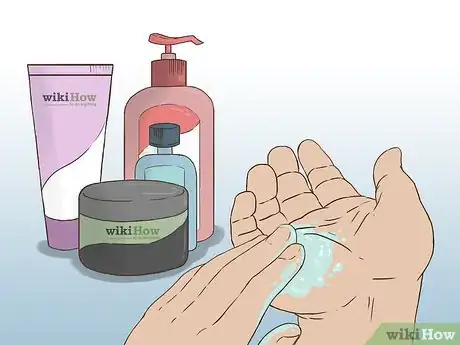



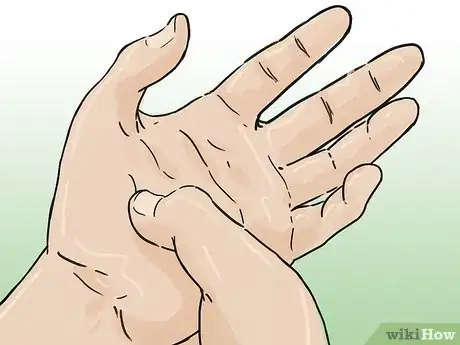
-Step-10.webp)

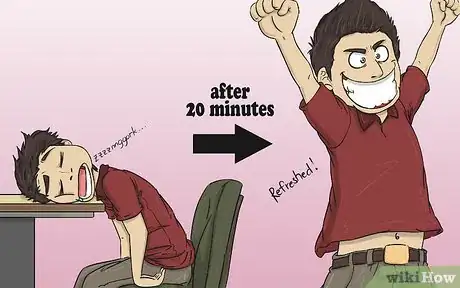









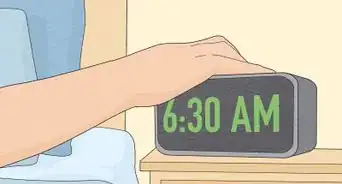




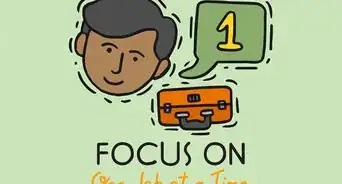


















































Medical Disclaimer
The content of this article is not intended to be a substitute for professional medical advice, examination, diagnosis, or treatment. You should always contact your doctor or other qualified healthcare professional before starting, changing, or stopping any kind of health treatment.
Read More...